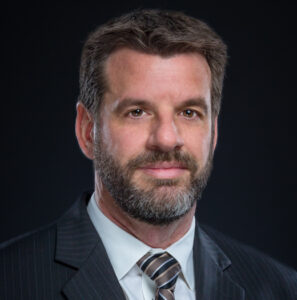
Now Enrolling: The EAQ211 trial is evaluating the impact of social and genetic factors on outcomes in teen and young adult cancer survivors
October 9, 2023
Trial Results: A promising new approach may help women with DCIS determine their personal risk of developing invasive breast cancer
January 22, 2024Reducing cancer health disparities for sexual and gender minorities

Diversity and equity initiatives within the ECOG-ACRIN Cancer Research Group (ECOG-ACRIN) date back to the 1990s. Today’s Health Equity Committee is a reflection of growth and expansion over time. For example, it now includes subcommittees and working groups dedicated to certain minoritized populations: adolescents and young adults, older adults, and most recently, sexual and gender minorities (SGMs).

Matthew B. Schabath, PhD (pictured), is the founding chair of the ECOG-ACRIN Sexual and Gender Minority Working Group, part of the Health Equity Committee. Dr. Schabath is a Moffitt Distinguished Scholar and co-leader of the Cancer Epidemiology Program at Moffitt Cancer Center in Tampa, Florida.
Below, Dr. Schabath provides an overview of the challenges faced by individuals who are minoritized because of their identity. He describes the health disparities this population faces relating to cancer screening, care, and clinical trial access—and the possible solutions.
Who does the phrase sexual and gender minority describe?
There are various definitions. The language and terminology have evolved rapidly, especially over the last decade. The phrase sexual and gender minority is an umbrella term used by the National Institutes of Health (NIH). Our working group follows the NIH framework, which states that sexual and gender minority (SGM) populations include, but are not limited to, individuals who identify as lesbian, gay, bisexual, asexual, transgender, Two-Spirit, queer, and/or intersex. Individuals with same-sex or -gender attractions or behaviors and those with a difference in sex development are also included. These populations also encompass those who do not self-identify with one of these terms but whose sexual orientation, gender identity or expression, or reproductive development is characterized by non-binary constructs of sexual orientation, gender, and/or sex.
What are some of the challenges that sexual and gender minority patients with cancer face?
The challenges extend along the entire cancer control continuum—which the National Cancer Institute defines as including cancer prevention, screening/early detection, diagnosis, treatment, and survivorship. Sexual and gender minorities share some of the same cancer health disparities as other minority populations, such as lack of access to care. In some cases, SGM populations have a higher prevalence of certain cancer risk factors. They are also less likely to participate in cancer early detection efforts. Sometimes they do not have primary care physicians, and their first point of care is in the emergency room. Many of these issues are common in other minority populations, such as racial and ethnic minorities, rural residents, and veterans.
SGM populations are also highly stigmatized. Several reports have documented instances where providers denied care to patients because of their sexual or gender minority status. SGM populations have also reported higher rates of violence and discrimination in healthcare settings.
What are possible solutions to these issues?
One important step is to improve disclosure. The scientific community does not adequately collect data about patients’ SGM status. For example, sexual orientation and gender identity are often not listed on patient intake forms. If care teams are not capturing this critical information, they cannot provide personalized care. When you are seeing a patient, you are not just treating their disease; you are treating the whole person.
Although I mentioned several disparities, those likely only scratch the surface because we are currently unable to identify our SGM patients. As an analogy, imagine if the scientific community had not been collecting race and ethnicity data for the last 25 or 30 years. The breadth and depth of the health disparities among racial and ethnic minorities would still be unknown. Improving the collection of sexual orientation and gender identity (SOGI) data at the institutional, state, and federal levels will help reveal the true burden and disparities in equity among the SGM population. Then, we can create interventions to mitigate disparities and inequitable care for SGM populations.
Why is it important to include this population in cancer clinical trials?
This population has been—and still is—largely invisible. Access to clinical trials is yet another barrier they face. Some of the language commonly used in informed consent documents, which outline who may and may not participate in a clinical trial, is often discriminatory toward SGM patients. A key initiative right now is to revise the informed consent documents and study protocols so that they use inclusive, unbiased language that accounts for identities beyond the traditional, and antiquated, binary female and male construct.
As noted previously, identification of SGM patients is a vital step toward ensuring they are not excluded from trials. This will also help with tracking their trajectories and outcomes. SGM patients certainly have been participating in clinical trials—but to date there is no sufficient way to identify them to review their outcomes. How do their results differ from those of cisgender and heterosexual patients?
What are the implications for patients who may not want their SGM status documented in their medical record?
Right now, there is limited data from SGM communities suggesting SOGI disclosure in healthcare is violating their privacy. The literature shows that the community wants to disclose so they are receiving affirming, personalized, and culturally sensitive care. Additionally, questions about SGM status can accommodate for this by offering response options such as “Choose not to disclose.”
A few years ago, you published the results of a survey conducted through ECOG-ACRIN to assess oncologist attitudes about SGM patients with cancer. What were your findings?
One key finding was that very few oncologists or institutions ask patients about sexual orientation or gender identity—though that statistic had improved from previous published survey studies. The needle is moving in the right direction, but not quickly enough. Oncologists also still hold differing views on the importance of collecting SOGI data. A minority of respondents said it was important to know sexual orientation, but the majority agreed on the importance of knowing gender identity. Finally, oncologists have a strong desire for education around these issues and how to best engage this patient population.
What can cancer research advocates do to help advance health equity for SGM patients?
Advocates can encourage patients and survivors who are part of the SGM community to participate in the cancer research process. Researchers and physicians from the LGBTQ+ community are active in ECOG-ACRIN, but increased involvement from LGBTQ+ patients and survivors would be invaluable. Their perspectives can help identify issues within the SGM community that would otherwise go unnoticed.

